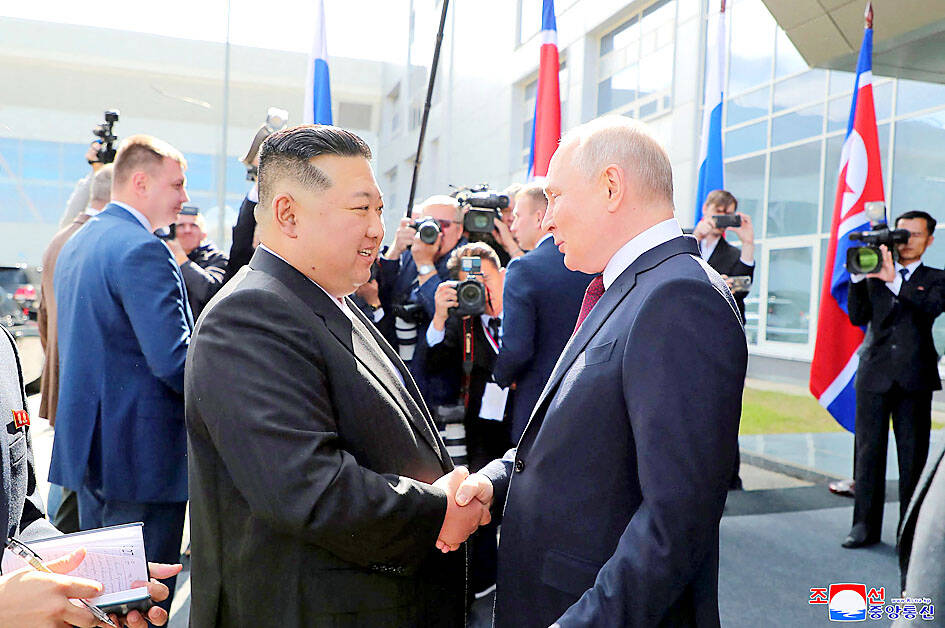Russian President Vladimir Putin has accepted an invitation to visit North Korea, Pyongyang’s state media said yesterday, as North Korean leader Kim Jong-un wrapped up a trip to meet with his ally.
Kim, who seldom leaves his country and has not traveled since before the COVID-19 pandemic, had a “historic meeting and talks” with Putin on Wednesday, the North’s Korean Central News Agency (KCNA) said.
Among the results of the leaders’ summit were Russian promises of help with North Korea’s fledgling space program, Russian news agencies reported, while Putin told reporters he saw “possibilities” for military cooperation.

Photo: AFP / KCNA VIA KNS
The head of South Korea’s ruling party criticized what he called “a devil’s deal” between Moscow and Pyongyang, while Japan warned against any contraventions of UN bans on arms deals with the North after the Putin-Kim talks.
“We are watching [the talks] with concerns including the possibility that it could lead to violations of the Security Council’s ban on all arms-related material transactions with North Korea,” Japanese Minister of Foreign Affairs Yoko Kamikawa told reporters.
After touring a space center and attending a banquet, Kim “courteously invited Putin to visit the DPRK at a convenient time,” KCNA reported, referring to the country by its official name. “Putin accepted the invitation with pleasure and reaffirmed his will to invariably carry forward the history and tradition of the Russia-DPRK friendship.”
Kim on Wednesday told Putin that he was sure Russia would win a “great victory” over its enemies.
“We will always be with Russia,” Kim said, according to footage broadcast on Russian TV.
“An old friend is better than two new ones,” Putin said, quoting a Russian proverb and referencing the former Soviet Union’s role in the Korean War.
Kim then “said goodbye to Putin, wishing him good health” and headed to his next destination, KCNA said, with Putin earlier saying that Kim would oversee a display of Russian warships in Vladivostok to “demonstrate the capabilities of the Pacific Fleet.”

A Chinese aircraft carrier group entered Japan’s economic waters over the weekend, before exiting to conduct drills involving fighter jets, the Japanese Ministry of Defense said yesterday. The Liaoning aircraft carrier, two missile destroyers and one fast combat supply ship sailed about 300km southwest of Japan’s easternmost island of Minamitori on Saturday, a ministry statement said. It was the first time a Chinese aircraft carrier had entered that part of Japan’s exclusive economic zone (EEZ), a ministry spokesman said. “We think the Chinese military is trying to improve its operational capability and ability to conduct operations in distant areas,” the spokesman said. China’s growing

Nine retired generals from Taiwan, Japan and the US have been invited to participate in a tabletop exercise hosted by the Taipei School of Economics and Political Science Foundation tomorrow and Wednesday that simulates a potential Chinese invasion of Taiwan in 2030, the foundation said yesterday. The five retired Taiwanese generals would include retired admiral Lee Hsi-min (李喜明), joined by retired US Navy admiral Michael Mullen and former chief of staff of the Japan Self-Defense Forces general Shigeru Iwasaki, it said. The simulation aims to offer strategic insights into regional security and peace in the Taiwan Strait, it added. Foundation chair Huang Huang-hsiung

PUBLIC WARNING: The two students had been tricked into going to Hong Kong for a ‘high-paying’ job, which sent them to a scam center in Cambodia Police warned the public not to trust job advertisements touting high pay abroad following the return of two college students over the weekend who had been trafficked and forced to work at a cyberscam center in Cambodia. The two victims, surnamed Lee (李), 18, and Lin (林), 19, were interviewed by police after landing in Taiwan on Saturday. Taichung’s Chingshui Police Precinct said in a statement yesterday that the two students are good friends, and Lin had suspended her studies after seeing the ad promising good pay to work in Hong Kong. Lee’s grandfather on Thursday reported to police that Lee had sent

BUILDUP: US General Dan Caine said Chinese military maneuvers are not routine exercises, but instead are ‘rehearsals for a forced unification’ with Taiwan China poses an increasingly aggressive threat to the US and deterring Beijing is the Pentagon’s top regional priority amid its rapid military buildup and invasion drills near Taiwan, US Secretary of Defense Pete Hegseth said on Tuesday. “Our pacing threat is communist China,” Hegseth told the US House of Representatives Appropriations Subcommittee on Defense during an oversight hearing with US General Dan Caine, chairman of the Joint Chiefs of Staff. “Beijing is preparing for war in the Indo-Pacific as part of its broader strategy to dominate that region and then the world,” Hegseth said, adding that if it succeeds, it could derail